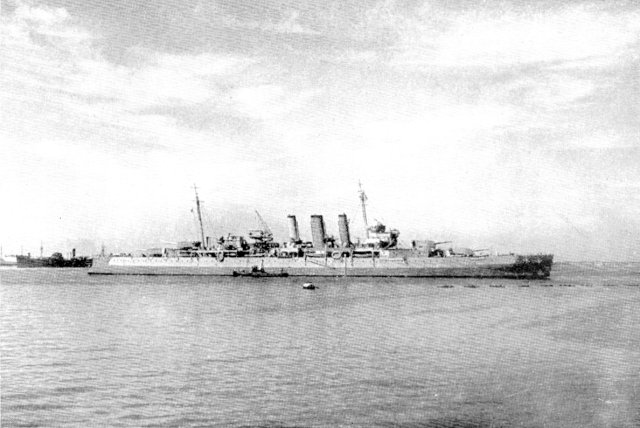


IN WORD AND PICTURE
by John H Marsh
H.M. CRUISER "DORSETSHIRE"
Three Fights To The Death in a Year
The war brought her back to Union ports on sterner business. In 1940 and 1941 she often called for fuel and supplies in between searching for raiders and escortisig convoys in the South Atlantic and Indian Oceans. She had nearly 100 South Africans among her crew of 750.
The photograph opposite was taken in Table Bay a few weeks before the Dorsetshire in May, 1941, made a 600-mile dash in 22 hours from her convoy in the North Atlantic to where the 41,000-ton German battleship Bismarck was fighting for her life with ships of the Royal Navy. After a brief exchange of shots with the crippled battleship, the cruiser ran in and sank her with three torpedoes. She rescued 70 survivors before reports that U-Boats were in the vicinity forced her to leave the scene.
In December of the same year the Dorsetshire encountered a German supply ship in the South Atlantic. The German ship scuttled herself as soon as the British cruiser was sighted.
Four months later, on the morning of Easter Sunday, 1942, the Dorsetshire and her sister ship, H.M.S. Cornwall, while steaming in company 400 miles from Ceylon, were set upon without warning by between 40 and 60 Japanese dive-bombers. Of ten bombs aimed at her by the first flight, eight hit the Dorsetshire, putting her out of action almost instantly. Within 20 minutes both cruisers had been sunk, having sustained 48 bomb hits between them. After 30 hours clinging to rafts and wreckage in shark-infested waters the survivors were rescued by a cruiser and two destroyers. More than 200 of the Dorsetshire's complement, including many South Africans, were lost.

Other well-known books published by John Marsh and available on the Internet
"Skeleton Coast" The
wreck of the Dunedin Star off the Skeleton Coast(Namibia) in 1942 - book recently republished
"No Pathway Here" The Annexation of Prince Edward and Marion Islands
John Marsh Maritime Collection A collection of 18000 photographs taken by John Marsh from 1920 of ships calling at Cape Town
Received Mon, 26 Jul 2021
Hello Mike,
My name is (as you may have guessed) Peter Higgins, and I just stumbled on your website "South Africa and the war at sea", and the final line on the page regarding HMS Dorsetshire which says "More than 200 of the Dorsetshire's complement, including many South Africans, were lost" vividly brought to mind a memory from many years ago.
My father, Stanley Augustus Higgins, was a stoker onboard HMS Dorsetshire from June 1940 until her sinking in April 1942 which he survived. He passed away aged 93 in July 2013.
I never forgot what he told me many years ago regarding his sad memories of the Dorsetshire's sinking.
At the time of the Japanese air attack dad was off-watch from the boiler rooms and the ships crew had been called to action stations, at the time dad was in charge of a damage control party up near the Dorsetshire's bows adjacent to the ships "paint locker". Very shortly after the commencement of the Japanese air attack, all comms in the ship were lost, though it was all too apparent that Dorsetshire was receiving a heavy pounding, with the ship heeling over and quaking from the impact of the Japanese bombs.
During the chaos and din, one concussion dislodged a length of heavy suction hose, known as an "elephant's foot" from its cradle on the ship's bulkhead, which hit dad on the head, knocking him senseless for several seconds. On regaining his wits in the now blacked out darkness of the compartment, dad, sensing that the ship was starting to list heavily, shouted for the party to get on the upper deck via a ladder leading to the "bosun's hatch" in the compartment roof. The first man up the ladder shouted that he couldn't unlatch the hatch "dogs". Stan had been carrying a crowbar before the attack commenced and luckily managed to find it in the darkness after he'd been knocked senseless and then used it to release the latches on the bosus's hatch and the party crawled out into the burning sunlight on the rapidly inclining foredeck. The one memory that in particular caused dad so much grief was that after they got to the upper deck, one party member, who was also a stoker on dad's watch, a South African named David Stephanus van Zyl, confided to dad that he couldn't swim and despite pleas from dad for him to jump overboard, he tragically went down with the ship, the rest of the party all survived.
For some reason I've never forgotten that man's name, and reading the page on your website, brought back to mind the brave & loyal service and sacrifice given by the South Africans and all other commonwealth members of the armed forces.
Its fitting that site's like yours continue to honour those brave service men and women, and for that I thank you.
Best wishes Mike,
kind regards
Peter Higgins (Southport, UK).